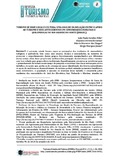Turismo de base local e cultura: uma análise da relação entre o apoio ao turismo e seus antecedentes em comunidades indígenas e quilombolas no Rio Grande do Norte (Brasil)
Data
2020-02-19Autor
Félix, João Paulo Serafim
Farias, Mayara Ferreira de
Chagas, Márcio Marreiro das
Marques Júnior, Sérgio
Metadado
Mostrar registro completoResumo
The present study sought to expose the residents' perceptions of indigenous and
quilombola communities, as well as their longings, desires and needs, in an attempt to promote the empowerment of these groups, historically marginalized by different social actors. In addition, he proposed an analysis on the perception of natives about tourism with a focus on traditional ethical groups. Specifically, we sought to corroborate the filling of gaps in this field of research and contribute as a theoretical basis for new work. To the point that, it was assumed that the identification of the antecedent factors of the support of the autochthon to the development of the
tourism could stimulate beneficial potentials to these Stakeholders. The population and sample of interest of this work is constituted by the residents of Catú dos Eleotérios communities, Sagi, Trabanda and Sibaúma, located in the southern coastal microregion of the State of Rio Grande do Norte in the municipalities of Baía Formosa, Canguaretama and Tibau do Sul. , in turn, was
performed by the convenience method, and the choice of subject was made using the simple
random method. The data collection was developed using a metric scale form of 11 points, in which [0] indicated total disagreement and [10] the full agreement, reaching a total of 200 valid questionnaires. The applied form was divided into 5 blocks, with affirmations regarding the perception of the impacts of tourism, attachment to the place, perception of the residents'
empowerment on tourism activity and evaluation of the performance of public power and support
to the development of tourism. Data analysis was performed using the Statistical Package for
Social Science software (SPSS 22.0). Data processing was performed from descriptive statistics,
exploratory factor analysis and Pearson correlation analysis. The main results of the research
indicated low evaluations of the respondents about the services and performance of the public
power of the study regions. In this context, it was recommended that local public authorities pay more attention to the needs and wishes of their citizens, in addition to a more affective and transparent action. From this perspective, it was concluded that it is fundamental to the first sector to elaborate actions that aim to include, raise awareness and encourage the participation of local communities in the management and development of tourism so that it is possible to increase confidence and support to the tourism, and suggestions for actions that can be developed and implemented so that there is a beneficial, interactive, harmonious and mutually beneficial relationship between tourism support and its antecedents in Indigenous and Quilombola Communities.




